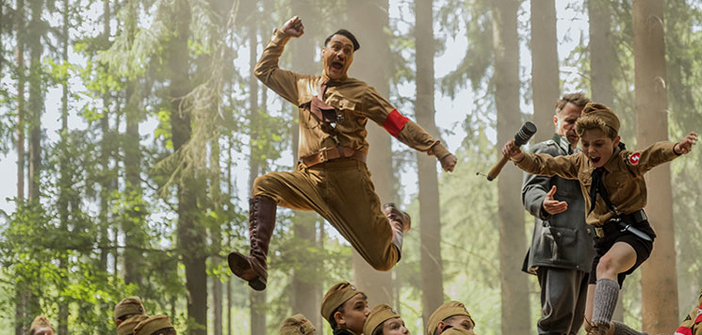Taika Waititi takes on the perilous task of creating a comedy about Nazism. Through the indoctrinated but innocent eyes of little Jojo, the New Zealand filmmaker successfully achieves his goal.
Is it possible to laugh at everything? That is certainly what Taika Waititi believes with “Jojo Rabbit.” Between two installments of the Marvel saga “Thor,” the director-actor-screenwriter-producer from New Zealand embarks on this ambitious project: a comedy about Nazism. He personally plays Adolf Hitler, the imaginary friend of Johannes Betzler, known as “Jojo,” a young boy indoctrinated by blind nationalism. The young boy’s ideals are shaken when he discovers that his mother is hiding a young Jewish girl in their home.
The film relies on a plethora of quality supporting roles (Sam Rockwell, Rebel Wilson, Stephen Merchant). Scarlett Johansson plays the brave, solitary mother of the boy, bringing sensitivity to the film and lending it a dramatic depth in contrast with its comedic elements. In “Jojo Rabbit” and “Marriage Story,” for which she is nominated for Oscars, the Black Widow actress reminds everyone of the incredible talent she possesses.
But the vitality of the film resides in the children.
Truly revelations, the young Roman Griffin Davis (Jojo), Archie Yates (Yorki), and Thomasin McKenzie (Elsa) excel in this film by bringing vitality and innocence to the former two and gravity to the latter.
A subtle humor for a sensitive topic
Making jokes about sensitive subjects is not easy, especially when the subject in question resulted in the deaths of several million people. Therefore, the script must be particularly intelligent.
Taika Waititi’s nuanced writing creates empathy for these Germans, the antagonists of history, by using humor to subvert their ideology. The Nazi leader becomes the absurd imaginary friend of a ten-year-old child. “Heil Hitler” turns into a running gag. The young boy’s enthusiasm to uncover the “terrible secrets” of Jewish civilization grants him innocence.
The director offers numerous visual innovations to create comedic effects. Window jumping, ten Nazis in a room, or the retrieval of tools for the party all become humorous scenes. Without resorting to cheap or juvenile humor, the film gives ample space to emotions. The dialogues or sometimes crude innuendos deal an unexpected blow to the audience, unprepared for such intensity following comedic moments. It is in this approach to hatred through absurdity, while maintaining a dramatic storyline, that the strength of “Jojo Rabbit” lies.
The film alternates atmospheres without ever getting lost in its transitions. It moves without descending into melodrama. It remains irreverent without being offensive. Taika Waititi proves with “Jojo Rabbit” that with intelligence, it is still possible to laugh at everything.
Paul Guianvarc’h


